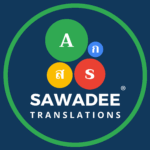
Table of Contents
You have an official document from your home country such as a birth certificate, a university degree, a marriage license. To you, it’s a valid legal paper. But to a Thai government official, it’s an unfamiliar document in a foreign language. To bridge this gap and make your documents legally recognized in Thailand, you need a certified translation.
Failing to provide a properly certified translation is one of the most common reasons for rejected applications at immigration, embassies, and government offices. This guide covers the top 10 documents that almost always require certified translation for expats, businesses, and travelers in Thailand.
1. Passports
While a simple photocopy of your passport is usually enough, a full certified translation of the bio-data page is sometimes required in more formal situations.
- When You’ll Need It Translated: Court proceedings, certain business registrations, or as supporting evidence in complex legal cases.
- Why It’s Critical: A certified translation ensures every detail on your primary identification document is officially recorded in Thai for legal purposes.
👉 See our full guide: Thailand Visa Options Explained.
2. Birth Certificates
This document is essential for proving identity, age, and parentage.
- When You’ll Need It Translated: Registering a marriage in Thailand, applying for a dependent visa for your child, child custody cases, or enrolling a foreign child in a Thai school.
- Why It’s Critical: Thai authorities require a certified translation to legally establish family relationships.

Need Certified or Legalized Translations for MFA or Embassy Use?
Our native translators and legalization team handle everything for you.
Get in Touch >
3. Marriage Certificates
This is crucial for any spousal-related immigration or legal matters.
- When You’ll Need It Translated: A foreign marriage certificate needs translation to apply for a Thai Marriage Visa (Non-O). A Thai marriage certificate needs translation to register your marriage in your home country via your embassy.
- Why It’s Critical: It is the primary document for proving your legal status as a married couple to both Thai and foreign governments.
👉 Related: Getting Married in Thailand as a Foreigner.
4. Divorce Decrees
This document proves the dissolution of a previous marriage.
- When You’ll Need It Translated: To prove you are legally single before remarrying in Thailand (required when obtaining an Affidavit of Freedom to Marry from your embassy) or for child custody and alimony legal proceedings.
- Why It’s Critical: Thai law, and most embassy procedures, require legal proof that any previous marriages have been officially terminated.
5. Educational Certificates & Diplomas
Your academic qualifications need to be understood by Thai authorities, especially for employment.
- When You’ll Need It Translated: Applying for a Thai Work Permit (your degree often needs to be translated), obtaining a teacher’s license, or applying for admission to a Thai university.
- Why It’s Critical: Employers and the Ministry of Labour require translated diplomas and transcripts to verify you have the necessary qualifications for a job.
6. Criminal Record / Police Clearance Certificates
This is a standard part of most background checks for immigration purposes.
- When You’ll Need It Translated: A foreign PCC for a Thai work permit or some long-stay visas. A Thai PCC for a visa or residency application in another country.
- Why It’s Critical: It’s a mandatory document to prove you have a clean record. An uncertified translation will be rejected.
👉 Full guide: How to Get a Thai Police Clearance Certificate.
7. Power of Attorney (POA) Documents
A POA grants another person the legal authority to act on your behalf.
- When You’ll Need It Translated: Authorizing someone in Thailand to sell your property, manage your business affairs, or represent you in court while you are overseas.
- Why It’s Critical: Legal validity. An inaccurately translated POA can be challenged in court, and government offices (like the Land Department) will not accept it.
8. Contracts & Legal Agreements
For any binding agreement, having a certified Thai version is crucial for legal protection.
- When You’ll Need It Translated: Business contracts, property purchase/sale agreements, and employment contracts. While you may sign an English version, a Thai version is essential for any potential legal disputes in a Thai court.
- Why It’s Critical: In a legal dispute, Thai courts will consider the certified Thai version of a contract as the definitive text.
9. Death Certificates
This official document is required for all administrative tasks following a person’s death.
- When You’ll Need It Translated: Settling the deceased’s estate, making life insurance claims, closing bank accounts, or repatriating remains to a home country.
- Why It’s Critical: Banks, embassies, and courts require a certified translation to legally process any matters related to the deceased.
10. Financial & Banking Documents
Many visa applications require proof of financial stability.
- When You’ll Need It Translated: Providing bank statements, income verification letters, or tax documents from your home country to support a Retirement or Marriage Visa application in Thailand.
- Why It’s Critical: Thai immigration needs to understand your financial documents to confirm you meet the visa requirements.
👉 See our guide: Visa Extension & 90-Day Reporting.
What Exactly Makes a Translation “Certified”?
A certified translation is far more than just converting words from one language to another. It is a professional document that carries legal weight.
An uncertified translation from a friend or an online tool is just a suggestion. A certified translation is a legal statement of fact.
In Thailand, a certified translation must include:
✅ A formal statement from the translator or agency declaring the translation is a true and accurate representation of the original document.
✅ The full name and signature of the qualified translator.
✅ The official seal or stamp of the registered translation company.
✅ The date of the translation.
Without these elements, Thai government offices, embassies, and courts will reject your document.
Frequently Asked Questions (FAQs)
Can I just translate a document myself if I speak Thai?
No. For official purposes, self-translated documents are not accepted. This is because it’s a conflict of interest and, more importantly, lacks the official stamp and seal from a recognized, licensed translator that government bodies require.
What’s the difference between Certified Translation and Legalization?
They are two separate steps. Certification is done by the translator/agency to guarantee the translation’s accuracy. Legalization is done afterward by the Ministry of Foreign Affairs (MFA) to verify that the translator’s signature and seal are authentic and registered. Most documents for official use in Thailand need both.
How long does a certified translation take?
For standard, single-page documents like a birth or marriage certificate, the turnaround time is typically 1-2 business days. More complex documents like legal contracts may take longer.
Conclusion
In the official world of Thai bureaucracy, if a document isn’t in Thai and isn’t certified, it might as well not exist. From securing your visa to handling legal affairs, certified translations are the essential key to ensuring your paperwork is recognized and accepted. Preparing them correctly from the start will save you from frustrating delays and rejections.

Need Certified or Legalized Translations for MFA or Embassy Use?
Our native translators and legalization team handle everything for you.
Get in Touch >
Share this post:
This post was last updated October 2025.







